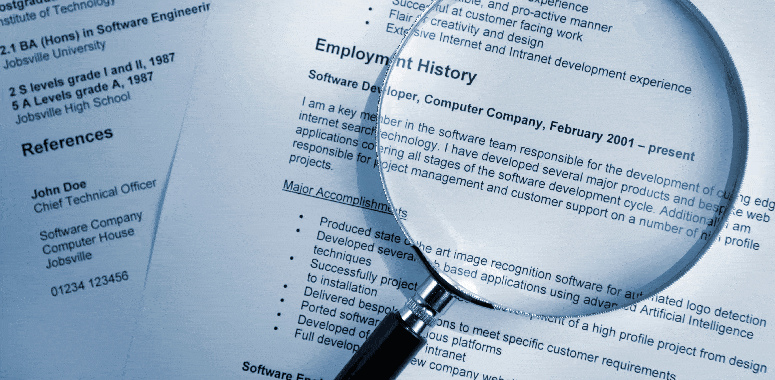Eight Lies to Avoid on Resume
Prior to the initial interview, your resume is frequently the first and only impression hiring managers have of you. It is frequently the major factor that is considered if you are called in for an interview for the post you are applying for. As a result of this, a lot of people feel the urge to exaggerate certain parts of their experience in the hopes of getting a chance to pass the interview. However, this greatly affects you in the long run and has a great impact on your career. It might not only be limited to that particular employer, but various others in the field. When dishonest employees are caught, they eventually get fired, which then ruins their reputation. In this article, we will be looking at eight lies to totally avoid on a resume.

Top Eight Lies To Avoid on Resume
To avoid losing a job interview, it is important to take note of common lies that you should avoid on your resume.
Listing Technical Skills You Don’t Have

People with relevant skills are known to be more desirable candidates for a particular position, so there is a need to add these skills to your resume. This is why most people want to add them to their resume even when they do not have these skills. It is important to refrain from writing technical skills that you do not have, as they will be tested during your interview. For instance, a developer may be told to fix or write a block of code. Going for an interview with a particular skill that you are unable to demonstrate can eventually prevent you from getting the job.
Overblown Salary History

It is quite advisable to avoid writing about your past salaries when putting together your resume. Since some employers seem to ask about this, ensure you say the accurate amount, as it is information that can be confirmed over a phone call. If you are dishonest about it and overstate the salary, it can be seen as a means to receive higher pay.
Listing Inaccurate Educational Backgrounds

It can be quite challenging when it comes to competing with a highly educated workforce. As a result of this, most applicants tend to include false statements about their educational background. This can include claiming extra credit from universities where the individual did not attend. Confirming an applicant’s educational background is now relatively easy to do, and it is a standard procedure for most HR departments. When caught lying about your educational background on your resume, you can be denied the job, or even if you have been employed, you can be fired immediately.
Name Dropping

In situations where you have worked with a massive brand, as you mentioned in your previous post, you should be ready to prove such claims to be true, as you have no idea who your employer might know. If your claims are researched and discovered to be false, you might end up losing your reputation, and this might not just be limited to the particular company, but to various others. Which is why it is important to be careful not to add the wrong information to your resume.
Volunteer Activities

One of the things that adds more value to your resume is volunteer work. Volunteer work offers employers the opportunity to get insight into your character and enables you to display extra skills or fill in positions that your resume might be a little too light to occupy. However, you should take note that volunteer work is absolutely confirmable, as most volunteer organizations keep accurate records of their activities for legal reasons. Therefore, it is important that you do not exaggerate your contributions to any organization.
Job Titles

If you are applying for the role of a sales manager but at your previous work place you worked as a sales associate, avoid the urge to fill in that you worked as a sales manager. One of the major questions asked during an interview is what position you held at your previous company. Either what is written in your resume is stated, or you are asked directly. No matter the situation, ensure that you do not lie about it, as when caught, it might result in you losing the job.
Language Skills

Understanding multiple languages will greatly affect your resume positively when added. In the eyes of your potential employer, this can be a useful tool for them in situations where the need to converse in that language arises. However, this can put you in a difficult situation when you boast about being very fluent in another language when you are not actually quite fluent in it. You don’t know when a situation will require you to converse with someone in that particular language you stated. To avoid such uncomfortable circumstances, avoid adding languages you are not fluent in to your resume.
Inaccurate Employment Dates

Remembering the precise date on which you were employed or left your previous work place can be quite challenging, especially when it has been a long time. Therefore, it is much more advisable to not mention it at all rather than to write an inaccurate date. Exact dates of employment are critical to include on your resume. However, in situations where you can remember the exact date, it is better to just write the year, leaving the month and exact date blank. Also, you can decide to contact your previous employer to be sure of the exact date you were employed. This is considered the best course of action expected of a responsible employer when it comes to hiring new recruits.
Conclusion
When writing your resume, absolute honesty is key, as it goes a long way towards determining your chances of either getting or losing the job. It is advisable to consider leaving out information you are not sure about rather than giving false details. Even though your lies might get you the job, your career is at risk in the long run. Therefore, make sure you are honest when writing your resume.






